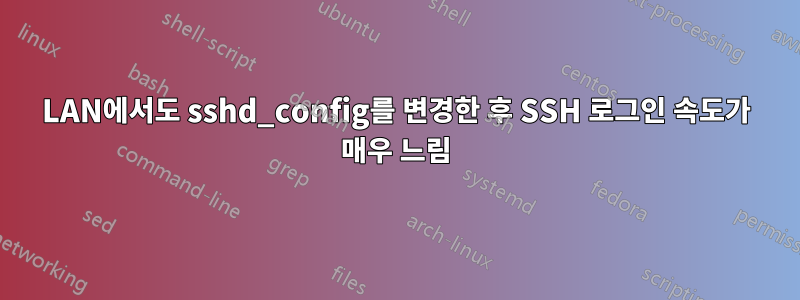
내 홈 서버를 인터넷에서 SSH 연결이 가능하도록 만들려고 합니다.
처음에는(구성 파일을 터치하기 전에) apt-get install openssh-server로컬 LAN에 있는 동안 매우 빠르게(기본적으로 즉시) 연결할 수 있었습니다. 그렇게 했고 ssh username@localIP즉시 비밀번호를 입력하라는 메시지가 표시되어 로그인할 수 있었습니다.
sshd_config파일을 기본값에서 다음과 같이 편집했습니다 .
# Package generated configuration file
# See the sshd_config(5) manpage for details
# What ports, IPs and protocols we listen for
Port 22
# Use these options to restrict which interfaces/protocols sshd will bind to
#ListenAddress ::
#ListenAddress 0.0.0.0
Protocol 2
# HostKeys for protocol version 2
HostKey /etc/ssh/ssh_host_rsa_key
HostKey /etc/ssh/ssh_host_dsa_key
HostKey /etc/ssh/ssh_host_ecdsa_key
HostKey /etc/ssh/ssh_host_ed25519_key
#Privilege Separation is turned on for security
UsePrivilegeSeparation yes
# Lifetime and size of ephemeral version 1 server key
KeyRegenerationInterval 3600
ServerKeyBits 1024
# Logging
SyslogFacility AUTH
LogLevel VERBOSE
# Authentication:
LoginGraceTime 120
PermitRootLogin no
StrictModes yes
RSAAuthentication yes
PubkeyAuthentication yes
#AuthorizedKeysFile %h/.ssh/authorized_keys
# Don't read the user's ~/.rhosts and ~/.shosts files
IgnoreRhosts yes
# For this to work you will also need host keys in /etc/ssh_known_hosts
RhostsRSAAuthentication no
# similar for protocol version 2
HostbasedAuthentication no
# Uncomment if you don't trust ~/.ssh/known_hosts for RhostsRSAAuthentication
#IgnoreUserKnownHosts yes
# To enable empty passwords, change to yes (NOT RECOMMENDED)
PermitEmptyPasswords no
# Change to yes to enable challenge-response passwords (beware issues with
# some PAM modules and threads)
ChallengeResponseAuthentication no
# Change to no to disable tunnelled clear text passwords
PasswordAuthentication no
# Kerberos options
#KerberosAuthentication no
#KerberosGetAFSToken no
#KerberosOrLocalPasswd yes
#KerberosTicketCleanup yes
# GSSAPI options
#GSSAPIAuthentication no
#GSSAPICleanupCredentials yes
X11Forwarding no
X11DisplayOffset 10
PrintMotd no
PrintLastLog yes
TCPKeepAlive yes
#UseLogin no
#MaxStartups 10:30:60
Banner /etc/issue.net
# Allow client to pass locale environment variables
AcceptEnv LANG LC_*
Subsystem sftp /usr/lib/openssh/sftp-server
# Set this to 'yes' to enable PAM authentication, account processing,
# and session processing. If this is enabled, PAM authentication will
# be allowed through the ChallengeResponseAuthentication and
# PasswordAuthentication. Depending on your PAM configuration,
# PAM authentication via ChallengeResponseAuthentication may bypass
# the setting of "PermitRootLogin without-password".
# If you just want the PAM account and session checks to run without
# PAM authentication, then enable this but set PasswordAuthentication
# and ChallengeResponseAuthentication to 'no'.
UsePAM yes
위 파일에서 변경한 줄의 초기 상태는 다음과 같습니다.
LogLevel INFO
PermitRootLogin without-password
#PasswordAuthentication yes
X11Forwarding yes
#Banner /etc/issue.net
나는 이것을 저장하고 sudo service ssh restart종료하고 로그인을 시도했지만 username@localIP어떤 이유로 로그인에 시간이 오래 걸립니다. 일단 로그인하면 연결이 매우 빠른 것 같습니다(내 LAN에 있기 때문에 그럴 것입니다). 이상한 점은 내 도메인 이름을 거치지 않아도 로그인하는 데 시간이 영원히 걸린다는 것입니다.
다음으로 포트 22를 내 서버의 고정 IP 주소로 전달하고 시도했지만 [email protected]로그인 속도가 훨씬 느려졌습니다. 서버에 접속하는 데 약 2분 정도 걸렸습니다. 그리고 연결되면 터미널을 닫고 다시 연결하여 수동으로 세션을 종료할 때까지 무작위로 정지되고 작동하지 않습니다. 때로는 전혀 연결되지 않고 입력한 후에 정지되는 경우도 있습니다 .ssh [email protected]
하지만 그렇게 하면 ping example.com모든 패킷이 평균 10ms의 핑 시간으로 매우 빠르게 되돌아오는 것 같습니다.
내 구성 설정이 어떻게든 엉망이 되었나요? 모든 것을 이전 상태로 되돌리고 SSH 서버를 다시 시작하려고 했지만 로그인하는 데에도 여전히 시간이 오래 걸립니다 username@localIP@.
지금까지 서버에는 단 한 명의 사용자(분명히 루트 외에)만 있었고 rsa 키 id_rsa.pub를 클라이언트 컴퓨터에서 file 로 수동으로 복사했습니다 ~/.ssh/authorized_keys. 폴더와 파일을 모두 수동으로 생성해야 했지만 .ssh작동하는 것 같고 비밀번호를 묻는 메시지가 표시되지 않습니다.


